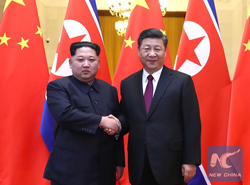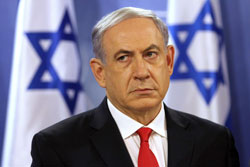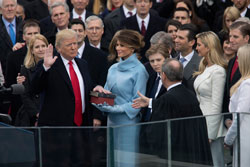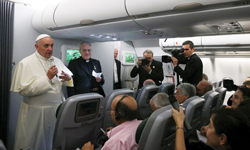The arrival of a mysterious, dark green, 21-car tinted train marked by a signature yellow stripe in Beijing’s central train station on Monday, March 26, incited speculation that it could be carrying North Korean Supreme Leader, Kim Jong-un.
Both Kim’s father and grandfather, former leaders of the country, opted for similar means of transportation on their foreign visits. In accord with the nation’s mysterious reputation, little is known about the armoured vehicle, when it is deployed, and its rumoured lavish interior and amenities.
Chinese state media officially reported on Wednesday, March 28, that Kim had completed a visit with Chinese President, Xi Jinping, in Beijing.
The visit spanned from late Monday night to Wednesday afternoon. The event marks Kim’s first ever known trip abroad since ascending to control of the notoriously isolated nation in 2011, as well as his first ever meeting with another head of state.
Reports suggest that the visit was made at the request of Jinping in anticipation for upcoming meetings with both South Korean and American leaders.
According to China’s official New China News Agency, Kim claimed that he is “willing to hold dialogue with the United States and hold summits between North Korea and the United States.”
With regards to denuclearization, Kim subtly implied the potential for it, “If South Korea and the United States respond to our efforts in good faith and create a peaceful and stable atmosphere,” and if “the current situation on the Korean peninsula has begun to develop in the positive direction,” China’s official New China News Agency reported.
Previous attempts at curbing North Korea’s nuclear development have not yielded permanent results as anticipated. Nuclear freezes in both 1994 and 2005 ended with the nation receiving relief from their sanctions, only to later resume their program in a slow, but nonetheless deliberate, manner.
“The regime has repeatedly used talks and empty promises to extract concessions and buy time,” said Congressman Ed Royce (R-CA), Chairman of the Foreign Affairs Committee in a media statement released on March 8.
China is North Korea’s only major trading partner and chief ally, even with both nations having less than amicable relations in the past. Pyongyang’s rapid nuclear missile development and testing was publically condemned by China, along with Kim’s aggression-inciting rhetoric which China viewed as a threat to international peace and stability. It has also been documented that China has backed multiple United Nations sanctions intended to limit exports of North Korean goods to China.
“Kim Jong-un’s visit to China bodes well for future talks with the USA. China is North Korea’s main ally. The latter would want to know the latest views of its ally before interacting with the USA,” said Kenneth Mitchell, Chair of the Department of Political Science and Sociology and associate professor of political science.
Even though this visit is the first known attempt on the part of North Korea to engage in some level of diplomacy and negotiation, denuclearization and trade appears to be at the forefront of the participating nation’s agendas. Kim’s upcoming few months consist of summits with South Korean President, Moon Jae-in, in April, followed by a meeting with U.S President, Donald Trump, in late May.
Recent role changes to key players in the Trump administration will also likely have an impact on the dynamic of the upcoming summit.
With the recent appointment of John Bolton as National Security Adviser, various narratives are emerging from those who had worked alongside him during his time as former-Ambassador to the United Nations. Many of the narratives recount his management style as being aggressive and skeptical, particularly toward the Obama-era Iran deal.
“Trump’s appointment of John Bolton strikes me as a poor choice. Trump campaigned on staying out of senseless foreign wars, a move that likely won him the GOP nomination because it separated him from the primary field,” Mitchell said.
Bolton recently wrote an editorial piece for the Wall Street Journal in February titled “The Legal Case for Striking North Korea.” Throughout the article, he both justified and actively advocated his support for a pre-emptive military strike against North Korea.
“It is perfectly legitimate for the United States to respond to the current ‘necessity’ posed by North Korea’s nuclear weapons by striking first,” he writes.
The basic framework of the 2015 Iran Deal forgave potentially crippling economic sanctions on Iran in return for the country accepting strict limitations on its growing nuclear energy program. Highly critical of multilateral agreements, especially the Iran Deal, Bolton will likely be a force moving against the recertification of the deal early this May.
“Americans by large margins agree with Trump that the invasion of Iraq represents the worst foreign policy mistake in history. It destroyed the Middle East, created terror groups such as ISIS, it caused the refugee crisis in Europe, it cost the USA dearly in blood and trust, and it tore apart America politically,” said Mitchell.
“John Bolton advocates more senseless wars, including one with Iran,” he adds.
U.S officials are working to solidify the anticipated meeting between the U.S and North Korea for the end of May.
With hard-liner Bolton now securing a seat at the table of these upcoming discussions, only time will tell how these summits will unfold and what resolutions—if any—will come of them.
IMAGE TAKEN from New China




